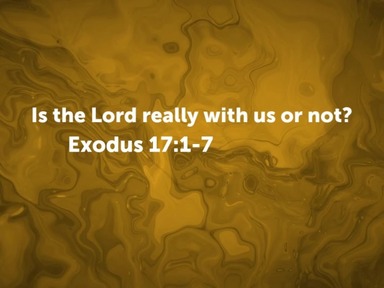Is the Lord really with us or not?

The whole Israelite community broke camp and set out from the Sin desert to continue their journey, as the LORD commanded.
They set up their camp at Rephidim, but there was no water for the people to drink.
The people argued with Moses and said, “Give us water to drink.”
Moses said to them, “Why are you arguing with me? Why are you testing the LORD?”
A few years ago, fourteen hundred Chicagoans met in the Grand Ballroom of a large hotel to honor a person selected as Chicago’s Mother of the Year. She turned out to be a woman no one had ever heard of. She was Mrs. Dominic Salvino, an Italian immigrant, a housewife, and extremely poor. Mrs. Salvino lived on Erie Street. She had many neighbors who were poorer than she. Most families had eight or ten children in them, and she had only four; her neighbors were old, she was only forty-nine; they were sick, she was healthy; they were tired, she was full of energy; they had problems like alcoholism, and she was steady emotionally, and so was her husband. Mrs. Salvino appointed herself to care for the people of Erie Street. She visited the sick, she collected money from the comparatively poor, and gave it to the desperately poor. She did the housework of the bed-ridden, cooked for the motherless, and spread smiles the length and breadth of Erie Street. Although she put about 1,600 hours a year into her personal mission, she did it quietly and without fanfare. But in a place of blighted hopes, she was an argument for dreams; in a place of failure, she inspired dignity and courage; in a place of empty arms and lonely rooms, she promoted love and caring.
Erie Street was a better and more beautiful place because Mrs. Dominic Salvino made a difference. She saw herself as God’s instrument, unique and useful.
Several years ago in his church, during the singing of the invitation hymn “Just As I Am,” a young woman named Mary came down the aisle to accept Jesus Christ as her Savior and Lord. Mary was in her early thirties, a divorcee who worked as a cocktail waitress at a local lounge. She’d met a woman at the beauty parlor, and her new friend had invited her to her church. She had come several Sunday evenings and now was presenting herself for membership in this holy flock.
After the service was over, people were visiting in the pastor’s study, and they suddenly discovered that Mary had never been baptized. They decided that several Sunday evenings later Mary would be baptized in the First Baptist Church. The woman who had invited her did an interesting thing. She sent out engraved invitations to the baptismal service—invitations like those you would send out for a wedding or a graduation. She sent them to every person in Mary’s social network—fellow workers, friends from the bowling alley, the beauty parlor, the cocktail lounge, neighborhood friends, and so on, and by the time that evening rolled around, the first three rows were filled with friends from Mary’s social web. Her former husband was sitting on one row, and her current boyfriend was sitting on another row.
Afterwards they had a reception in which they had a great time simply singing songs … it was a celebrative evening. Very briefly, the pastor shared with the people what had been happening in Mary’s life, and simply announced to them that all the resources and ministry of that church were available to them, as well as the friendship of Christ Himself.
To make a long story short, for the next eight Sunday evenings, Mary once again walked the aisle during the singing of an invitational hymn. But this time, rather than bringing herself to the faith, she was bringing one or more of her friends.
You see, someone brought Mary to Christ by sharing her witness intentionally at the beauty parlor. Then Mary, by simply adding to her everyday routine a self-conscious decision to be Christ’s witness, brought scores of others to Christ.